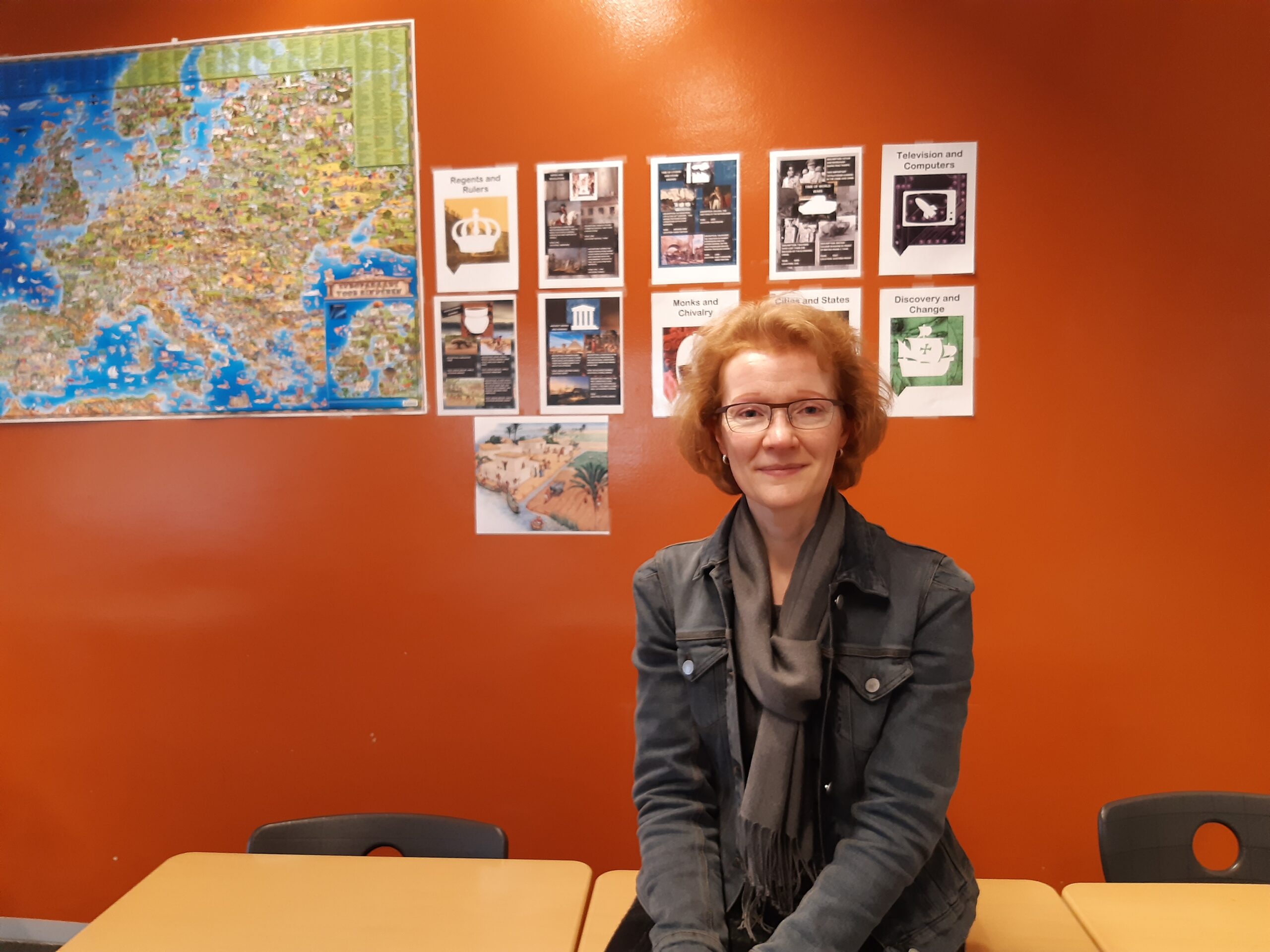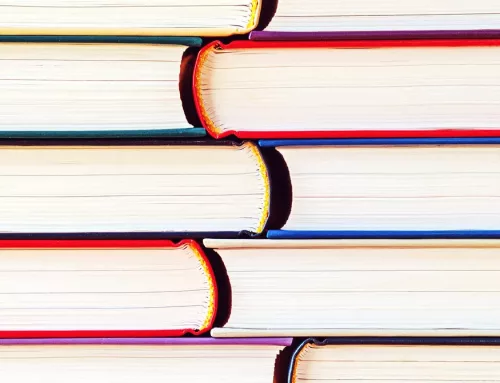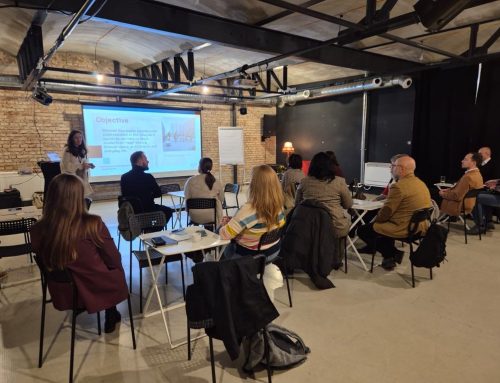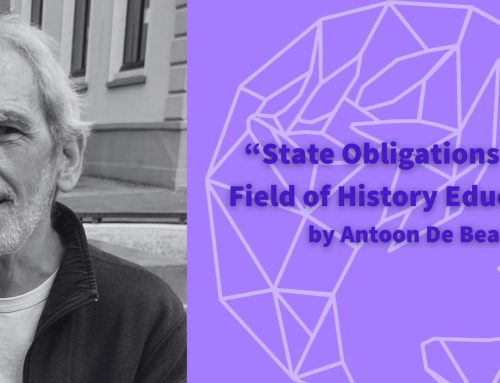“What I actually want to do is use history to show students: where do we come from, who am I, what is my place in the world?” Check out our new interview with Marianne de Soeten, winner of the 2020 History Teacher of the Year award in the Netherlands.
Marianne de Soeten, history teacher at Van Lodenstein College in Barneveld, the Netherlands, won the title of Best History Teacher of the Year 2020 in the Netherlands in autumn of last year. The annual prize is organized by the Rijksmuseum in Amsterdam, in association with the NTR (Dutch public broadcaster) and Nationaal Archief (National Archives).
EuroClio sat down (virtually of course) with Marianne to find out more about her path to history teaching, her experiences as a teacher through a turbulent 2020, and what she believes is the goal of history education for her students.
Marianne had an unconventional route to history teaching. In the Netherlands, secondary teachers are normally educated with a four-year degree, either from a college or a university. Marianne however started off as a primary school teacher.
“After secondary school, I wasn’t sure what I wanted to do. I thought maybe teaching. So I went to teacher training college for primary school. At the same time, I started a four-year-course of English that resulted into a teaching degree of English for secondary school.” Along with these studies, Marianne also minored in History and Music. She began as a primary school teacher, and taught English at secondary school as well. Eventually she moved to also teaching history at secondary school level, for the lower grades (ages 12-14) which at the time was allowed in the Netherlands because of her teaching degree and the fact there was a shortage of teachers in secondary schools.
Marianne has had an interest in history from a young age. “History was one of my favourite subjects at secondary school. I’ve always been interested in visiting museums, old castles, places of interest. I think it was also because of the way my parents raised me, it was just part of my growing up. I come from a family where history is quite important, and also storytelling. I just grew up with telling stories. My grandfather and especially also my uncle were quite good at it. I think it gives you a certain way of thinking and imagination.”
It is quite common to have strong second language programs in Dutch schools. “It’s a kind of tradition that every Dutch person speaks some foreign languages.” Marianne explains. “And of course, English has replaced German and French. I also think there is a kind of need in our country. We’re just a very small country. There’s a lot of trade going on, we’re all in commerce, so to survive we have to. Apart from that, there’s also the aspect of internationalisation with effects on education too.”
Marianne’s school offers classes in English, in the CLIL (Content Language Integrated Learning) system. This was done, she says, to both raise the level of English performance within the student body and stand out from other schools for prospective students. “So that means, for instance, that I teach history in English.”
It is Marianne’s proficiency in English that allowed her to keep teaching history, despite not having a history-specific secondary school teaching degree. “The school inspector said that when she is proficient in English that is also necessary for teaching history in English. The inspector therefore granted a temporary dispensation from the normal rule so I could continue teaching history.”
Despite starting out in English, Marianne has since switched her allegiance. “It was just some years ago that I realized that actually my love is for history and that I would regret it if the temporary dispensation would be lifted. I also like English very much, but history appeals more to me, because it has more to do with people and our society and civilisation. The fact that you are busy with the world around us, that you can explain events that are happening now, that they have a relation to the past, it’s very meaningful. It’s more identity forming than English, although that is also a very important subject” she is quick to add.
“But I always said I actually would like to be qualified,” she continues. “I mean, I had the idea that I could teach history but you want to have your degree, not only for yourself but also for your students and for your school.” The busy schedule of a full-time job and additional tasks at school kept Marianne from pursuing the four-year degree necessary to be a ‘fully-certified’ history teacher. Until she found a special part-time course for teachers to top-up their qualifications. “And then I thought well maybe that’s very interesting. I contacted them and I found out I was the first student for history who contacted them about the part-time course”. Two years later, Marianne is almost finished. “Thanks to two lockdowns I’m slightly behind in my program. My original date was December for finishing off everything. Now it’s June. It will be a hard job to finish but I’m just struggling on.”
Going back to school after years of teaching, did she learn anything during her course? “In didactics, it sounds a bit weird, but I didn’t need any training. But this [the course] is very subject specific. And I found out there were really things I didn’t know about. For instance, historical thinking. I was aware of doing that because I did do so [in her lessons]. But I learned a lot more about it, like why do they have to learn that? And I have a better view about it now.” She goes on to describe how it informs her lessons. “Students have to find out that our time is different from the past. It’s only then that they can see that things change but there are also things that continue, so change and continuity. And when you add facts to that, actually you can make so many new connections. So that is something that I’m really interested in, and I actually gave it quite a big place in my lessons.”
The search for the Best History Teacher in the Netherlands starts with nominations. In this case, it was a class of Marianne’s own students, along with the help of a colleague, that put her up for it. “I was totally surprised, it was very special. At first I said, ‘No, no, I don’t want it, I’m not good enough, I don’t want this at all!’, but well you know it happened so I tried to enjoy it.”
Was this title something Marianne had already been aspiring to? “No one ever asked me before, but I’ll tell you honestly, I didn’t even know about the award. I didn’t know it existed. But I really felt very, very honored.” Since winning the title, how has she found it? “Being a kind of ambassador for history and history teachers all over the Netherlands, I find it a great honour and also quite a responsible task to do so. Funny thing is only that some people think that I know everything. A few weeks ago I was phoned by a TV news station and they wanted to hear my ideas about the Dutch elections. But being a history teacher doesn’t mean that you know everything about politics. So I just had to say sorry, I can’t help you with that.”
We asked more about Marianne’s teaching style and lesson planning. She noted three key aspects. Firstly “There are always ways that I try to connect to our present day and age.” For instance, that day Marianne had been looking at the rise of Mussolini with her class and relating the political unrest in interwar Italy to the current unrest in the Netherlands against the institution of a curfew as a COVID-19 measure. “So that’s one important thing. The other thing is I always try to invite a person from history in my classroom. And I sometimes literally do so, I have a big poster of the person on my screen and I say, ‘Good afternoon Mr…’ and then I name the name.” Marianne invites the students to ask questions to their classroom visitor, “and we try to dig into the history and find answers to these questions”.
“On the other hand, I’m also a typical teacher,” she continues. “I really want my students to understand their textbook and the things that I think are important. I find it very important to be clear and to make sure that even weak students get the idea of what is taught. So, there are three factors that are quite important.”
She adds one more to these three. “And of course, the last bit: I would like to make students interested and to see history as a kind of time travelling. I mean, what’s more exciting than time travelling?”
2020 brought in online learning across many countries. The Netherlands did so in spring, and though returned to in-person teaching for some months, since January is currently back to online learning for all secondary school students. “The first time in March, I was really at a total loss.” Marianne describes. “I didn’t know what to do. Talking to a screen, I found it so difficult. I want to see my students, see them in the eyes. I just want to connect with them all the time.”
There are some discoveries though. To provide all resources possible with her students, she now creates her lessons in PowerPoint and shares with the class. “On the other hand, I also see that there are students, especially the ones who have difficulty concentrating, they say that this works for them. Especially because of the PowerPoints I put online. They say, ‘if I’m not sure or I miss something, I can just watch it back or listen to it again’.”
In addition to lockdown learning, this year also saw the murder of history teacher Samuel Paty in France. His death was related to teaching around the controversial cartoon of Muhammad in the Charlie Hebdo attacks. How did Marianne react to this news with her class? “We didn’t really talk about the teacher, although it was a great tragedy, but we talked about using cartoons. What is a cartoon? And it was quite nice, because students are so open, they really understood that a cartoon is subjective. It shows what someone thinks about the topic, gives expression to that way he thinks. And a cartoon is also used to evoke a reaction of other people.”
This led into a special workshop designed by Marianne. “I said ‘Okay we are going to look at some cartoons, I’ll just take some from history, but I’ll also take some that had to do with the cartoon and the killing in France’. I said, ‘Are you okay with that?’. I asked them first, I’ve never done that before, but I did that then. And my students were actually quite eager. They made a kind of checklist: what is the cartoon, why can it be controversial to one group, why could it be okay to another group? And I was very happy with that because I was a bit worried too.”
Marianne reflected on her feelings about it then and how it relates to her status as a teacher. “I’m still struggling with it, thinking about it, but I do think that you should keep in contact with your students. Because if you are silent about it, you agree with everything and as long as somehow it’s discussable, you can talk about it. There is a way to get out. That’s all I can say about it. Although of course we all realize that as a teacher you have quite an impact on teenagers in all sort of ways. So it shows you all the more the importance but also the vulnerability of you as a teacher.”
This workshop approach fits in with Marianne’s philosophy of history in general. She was quoted in another interview: “For me, history is a way of breaking down boundaries between people.” We asked Marianne to expand on that point. “What I actually want to do is use history to show students: where do we come from, who am I, what is my place in the world? But then also to open their interest to other people. These people have a history too, and their way of thinking and their culture also has a story and a past. For instance, most interesting is when you can find that somehow actually our histories are related. And then you can open up their interest and their minds.” This she feels can break down boundaries.
To sum up, we asked Marianne what she sees as the goal of history education for her students. “I want them to understand why things in this world are the way they are. It’s very easy to have your arguments ready, but there’s always a story behind. And the way we live now, even your family traditions, are based on history. It’s easy to say other people are wrong, you are right, but there is a story behind it, and I think that we should be much more aware of the stories behind.”
She adds as well, especially in the age of social media, she wants her students to think critically. “We study history but actually history doesn’t exist. Because what is history? History is a reconstruction of things that we think happened on the basis of a number of sources that we think are reliable. We made a reconstruction and we said ‘Yes, this makes sense, probably this is it’. But when we find other sources that we didn’t know before, we sometimes have to adapt and that’s no problem as long as you are sure it’s based on reliable sources.” Through this historical thinking, Marianne hopes to show “actually there is no objectivity, because the way you think is also a part of history, or a culture”.
In closing, she adds, “I also want them just to look at this world. What is this world I live in? Why does this happen? As Theodore Roosevelt said: ‘The more you know about the past the better prepared you are for the future’.”
Written by Rebecca Jackson
Who will be the best History Teacher of the Year 2021? Register him/her now!
Please forward this call to students as well – they can nominate, too. Deadline: 1 April 2021
The election of the History Teacher 2021 is an initiative of NTR, the National Archives and the Rijksmuseum.













